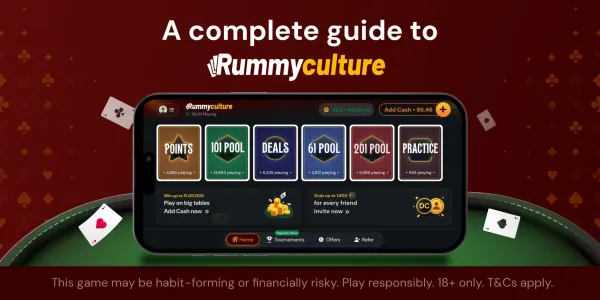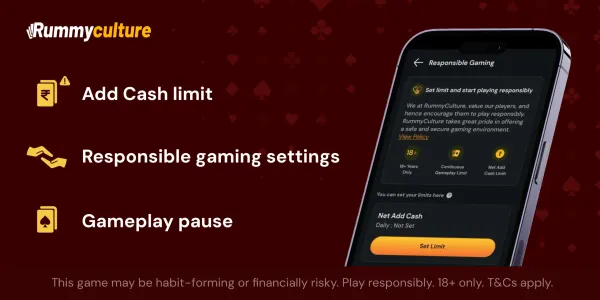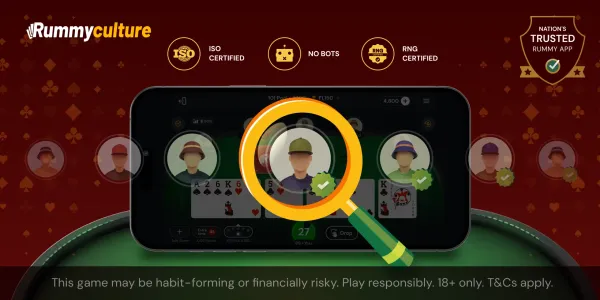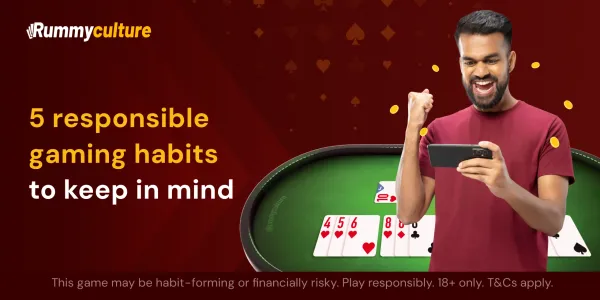- Home
- Rummy World
- Right time to ‘drop’ in rummy: guide and gameplay examples
Right time to ‘drop’ in rummy: guide and gameplay examples
In a game of Indian rummy, a ‘drop’ is when a player decides not to play a specific deal. They can sit out of that particular deal by choosing the Drop option on the gametable.
RummyCulture Elite Editors | 19th Dec, 2024
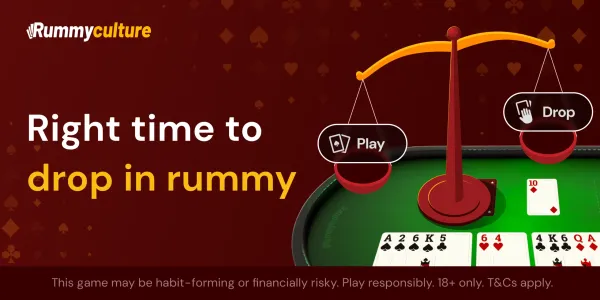
Right time to ‘drop’ in rummy: guide and gameplay examples
Indian rummy is a skill-based game where the more you practice, the more you start winning. It takes a blend of knowledge, strategy, and observation skills to be able to win at Indian rummy. But, there is one more ability pro players possess that is hard to grasp for beginners: knowing when to drop out of the game. Pros strategise their drops in order to minimise their losses if they don’t feel very confident with their hand.
Beginners often struggle to recognise when they should drop out, or what conditions to watch out for to make the decision of dropping. In this article, we will be discussing just that with some gameplay examples.
What is a ‘drop’?
In a game of Indian rummy, a ‘drop’ is when a player decides not to play a specific deal. They can sit out of that particular deal by choosing the Drop option on the gametable. Dropping can be done at any stage within the game before a valid declaration is made, and is penalised with a fixed number of points depending on which turn a player chooses to drop at. Seasoned players generally drop when they feel the potential penalty points from playing a certain deal could be much larger than the fixed points for a drop.
Types of drop in Indian rummy
There are mainly three types of drops in Indian rummy; first drop, mid drop, and full drop.
- First Drop: When a player drops on their first turn in a round before picking a card.
- Mid Drop: When a player drops on any other turn in a round except the first before picking a card.
- Full Drop: An invalid declaration is considered a full drop and is usually penalised with the maximum points i.e. 80 points (except in 61 Pool, where it is penalised with 60 points).
?Special case: consecutive missed turns
When a player doesn’t pick a card for a certain number of turns, it is considered and given the same points as a mid drop. The number of missed turns leading to a drop can be changed in the settings on the RummyCulture app.
Penalty points for dropping
When a player chooses to drop, they are given a fixed number of points at the end of the deal. Here’s a handy guide for point calculation in case of a drop.
| Game Format | On First Drop | On Mid Drop | On Full Drop
(Invalid Declaration) |
| Points | 20 | 40 | 80 |
| Deals | 25 | 50 | 80 |
| 61 Pool | 15 | 30 | 60 |
| 101 Pool | 20 | 40 | 80 |
| 201 Pool | 25 | 50 | 80 |
When to drop: scenarios and gameplay examples
As you become more adept at rummy game, it will become easy for you to understand which hand should be played and which shouldn’t be. Lose the battle, win the war they say. Sometimes dropping out of a round helps save points for future rounds where one may get a more meldable hand.
Let us understand how pro players decide when to drop with some examples.
Scenario 1: when there is no pure sequence
One of the biggest reasons many seasoned players choose to make a first drop is when their hand has no pure sequence. As per the rummy rules, a pure sequence is compulsory to make a valid declaration.
Consider the following example from a game of 101 Pool:
2♣ 4♣ 7♣|A♠ 4♠?8♠| 7♥ 7♦ 7♠|10♦2♥ A♦
8♠ is a wild card Joker
In this hand:
- There is NO pure sequence.
- There is 1 impure sequence and 1 set, but without a pure sequence, they are considered invalid.
In this case, the total points would be the sum total of ALL cards:
2 + 4 + 7 + 10 (Ace) + 4 + 0 (Joker) + 0 (Joker) + 7 + 7 + 7 + 10 + 2 + 10 (Ace) = 70 points
First drop in 101 Pool = 20 points
Mid drop in 101 Pool = 40 points
Hence, the player could have saved at least 30 points by dropping from this deal.
Scenario 2: when there is no joker
While it is completely possible to win a game of Indian rummy without a Joker card, pro players often decide to drop when they have incomplete melds waiting for a Joker card.
Suppose a player has the following hand in a game of 101 Pool, after their 4th turn:
3♣ 4♣ 5♣|A♠ J♠ 9♠| 7♥ 7♦ 7♠7♣|A♦A♥ A♣
In this hand:
- There is a pure sequence.
- There are 2 sets, but without another sequence, they are considered invalid.
The player may choose to wait to potentially create a J♠ 10♠ 9♠ or a 9♠ 8♠ 7♠ sequence, but when the stakes are high many seasoned players won’t risk waiting.
In this case, the penalty points are:
10 (Ace) + 10 (Jack) + 9 + 7 + 7 + 7 + 7 + 10 (Ace) + 10 (Ace) + 10 (Ace) = 87 points
The maximum points a player can get in a game of 101 pool is 80, so the player will be given 80 points and not 87.
Now, if the player had chosen to drop midway, their penalty points would have been 40. They could have thus saved 40 points.
Scenario 3: ungrouped high-value cards
Sometimes a player may just keep drawing too many high-value cards that don’t fit in any valid sets or sequences. A player may then choose to discard high-value cards if they get cards that fit their existing melds, or simply replace them with low-value cards to reduce their overall points.
If you have multiple ungrouped high-value cards and think your opponent is getting close to making a valid declaration (for example, by observing that they have been drawing consecutive cards), it may be a good idea to drop even if you have other valid melds yourself.
Suppose a player has the following hand in a game of 101 Pool, after their 5th turn:
3♣ 4♣ 5♣|A♠ K♠ 8♠| 7♥ 7♦A♦J♥ J♣ 9♦ 10♠
8♠ is a wild card Joker
In this hand:
- There is a pure sequence.
- There is an impure sequence.
The total points will be:
7 + 7 + 10 (Ace) + 10 (Jack) + 10 (Jack) + 9 + 10 = 63 points
Mid drop in 101 Pool = 40 points
The player could have thus saved 23 points by choosing to drop.
| Must-Visit Links for Rummy Enthusiasts | ||
| Rummy | Free Rummy | Indian Rummy |
| Real Cash Rummy | 13 Card Rummy | Rummy Download |
| Rules of Rummy | Rummy Variations | Rummy Tournaments |
| Pool Rummy | Points Rummy | Deals Rummy |
Practice makes perfect
Gauging when to drop, just like the other skills in rummy, comes with experience. The more you play and build familiarity with the game, the more instinctive you become about what cards could be beneficial to you. Indian rummy is all about minimising your penalty points, so dropping at the right time is a good tool to have.
You can start with practice games on RummyCulture to hone your rummy skills!
Featured articles


